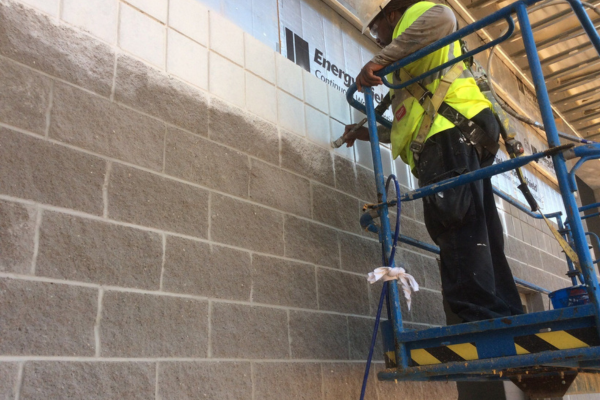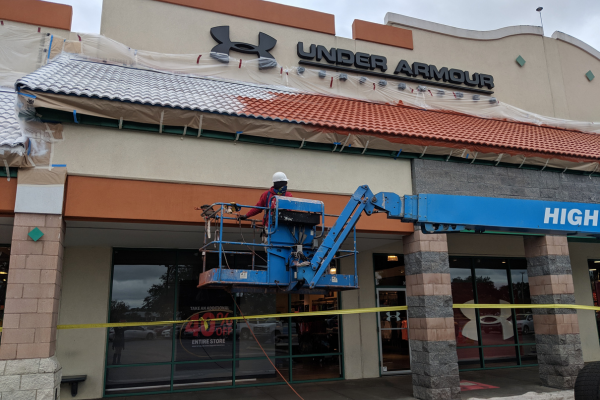
Proper disposal of old paint and other hazardous materials is crucial for environmental safety and compliance with federal and state regulations. Here’s a detailed guide on how to manage these materials responsibly.
Importance of Proper Disposal Commercial Coatings
When you hire professional commercial painters in the greater Jacksonville area, they often handle the disposal of leftover commercial coatings and materials for you. However, if you undertake a DIY (Do It Yourself) project, you need to know how to dispose of these materials safely and legally. Incorrect disposal can lead to environmental harm and legal consequences.
Types of Commercial Paint and Their Disposal Methods
Latex-Based Paint Disposal
Latex paint, also known as water-based paint, is less hazardous than oil-based paint and has lower VOCs. However, it still requires careful disposal. Follow these steps to dispose of latex paint if left behind after a commercial painting project:
- Solidify the Paint: Add a paint hardener, kitty litter, mulch, or shredded paper to the paint can. Allow it to solidify completely. This process can take a few days, depending on the amount of paint.
- Disposal: Once the paint is solidified, you can dispose of it with your regular household trash. Ensure the paint can is left open so waste collectors can see the contents are solid.
Note: Never pour latex paint down the drain, onto the ground, or into any water body. This can cause environmental contamination.
Oil-Based Paint Disposal
Oil-based paint is considered hazardous waste due to its toxic and flammable properties. Here’s how to dispose of it properly:
- Local Hazardous Waste Facility: Take oil-based paint to a local hazardous waste disposal facility. Check with the facility beforehand to understand their specific requirements.
- Storage: Store oil-based paint in its original container with the label intact. This helps the facility identify the contents and handle them appropriately.
Additional Hazardous Materials From a Commercial Painting Project
Apart from paint, there are other materials that require careful disposal:
Solvents and Thinners
Solvents and paint thinners are flammable and toxic. They should never be poured down the drain or thrown in the trash. Instead:
- Collection: Collect these substances in a sealed container.
- Disposal: Take them to a hazardous waste disposal site. Some facilities offer drop-off events for hazardous household waste.
Aerosol Cans Used for Commercial Painting Project
Aerosol cans can be dangerous if not disposed of properly, as they can explode under pressure. Here’s what to do:
- Empty Cans: If the can is completely empty, it can often be recycled with other metal cans.
- Partially Full Cans: If the can still contains product, take it to a hazardous waste facility.
Batteries and Electronics
Batteries and electronic devices contain harmful chemicals and should not be disposed of in regular trash. Instead:
- Collection Points: Use designated collection points or recycling programs offered by local waste management services or retailers.
- Special Programs: Participate in e-waste recycling events organized by community groups or environmental organizations.
Environmental and Health Considerations From Paint and Hazardous Materials
Improper disposal of hazardous materials can lead to significant environmental and health risks, including:
- Water Contamination: Chemicals from commercial paint and solvents can leach into groundwater, contaminating drinking water supplies.
- Air Pollution: Burning hazardous materials can release toxic fumes, contributing to air pollution and respiratory problems.
- Soil Degradation: Hazardous waste can damage soil quality, affecting local plant and animal life.
Tips for Reducing Hazardous Waste
- Buy Only What You Need: Purchase the right amount of paint and other materials to minimize leftovers.
- Reuse and Recycle: Donate leftover paint to community projects or recycle it if possible.
- Proper Storage: Store materials properly to extend their shelf life and reduce the need for disposal.
Commercial Painting Projects – Safe Removal of Commercial Coatings and Hazardous Waste
Proper disposal of old paint and hazardous materials is essential for protecting the environment and human health. By following these guidelines, you can ensure that you handle these materials responsibly. Always check with local waste management authorities for specific disposal instructions and facilities available in your area.
Our commercial painting teams ensure that the area is left cleaned upon completion of the customer’s project. Once the project is complete a member of the quality control team ensures that our customer’s are happy with the quality of the project as well as clean up is complete so that our customers’ don’t have to worry about proper disposal.






